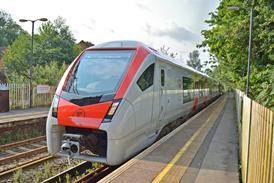JUST HOW much the hugely-trumpeted reform of German Railway has fallen short of its objectives is now becoming painfully clear. Part of the trade-off for restructuring was government promises to invest in modernisation to make the 37525 km network more competitive. This continued a long tradition whereby transport ministers responded to DB chief executives by pouring more money into the pot. The result was the acquisition during the 1990s of hundreds of new high speed trains, locomotives, and regional trainsets in an investment programme that made other European railways green with envy. The process continues to this day, and current DB boss Hartmut Mehdorn has successfully persuaded his masters that still more is needed - a DM27·3bn package of financial support was agreed on March 1.
Although DB’s results for 2000 showed an operating profit of DM390m, the monster of runaway costs has not been tamed, and operating losses are forecast for the next two years. More immediately, there are signs that turmoil threatens to engulf Mehdorn and his policymakers. Ever since his arrival on January 1 2000, Mehdorn has been outspoken in his opposition to further moves towards separating operations from infrastructure. Indeed, disagreement over this issue was one factor behind the departure on March 7 of DB Supervisory Board Chairman Dieter Vogel. In his letter of resignation, Vogel criticised the government for not supporting his own views. The government lost no time in finding a replacement; the Chief Executive of Preussag Michael Frenzel was voted in on March 14.
Quite why Transport Minister Kurt Bodewig accepted Vogel’s resignation is unclear, as the two men’s views on separation were not far apart. On March 10 Bodewig addressed the Green Party’s congress, and he took the opportunity to announce a programme of sweeping reforms. High on his list of changes was a commitment to separation as a means of introducing ’healthy and productive competition’.
Some of this appeared beforehand in Der Spiegel, with Bodewig saying it was no longer a question of ’if’ but ’when’ - he hopes to introduce legislation ’this summer’. Mehdorn responded on March 9 that the decisive question was how legal separation was to be achieved. ’For me the technical integration of wheel and rail is essential’, he noted, adding that the question of separation would now be investigated. Indeed it will, as Bodewig has appointed a four-man task force to do just that, including Parliamentary State Secretary for Transport Stephan Hilsberg and Chairman of the Rail Committee in Nordrhein-Westfalen Franz-Josef Kniola.
Earlier in March Mehdorn had announced plans for massive cutbacks in wagonload freight services from 2002, with rail service withdrawn from 2100 smaller depots and several marshalling yards closed. Around 85% of turnover is generated by just 320 out of over 7000 customers. DB’s withdrawal may open up opportunities for private operators, and DB will be required not to disconnect yard and depot access for two years. But road haulage will be quick to exploit the opportunity too, and much of the traffic could be lost if DB is not prepared to co-operate with companies it currently sees as on-rail rivals.
Perhaps in an attempt to soften the blow, DB says that it is investing DM2·2bn in new freight locos and DM1·6bn in new wagons to attract new customers with more reliable and modern vehicles. Time will soon tell if it is money well spent. n




















